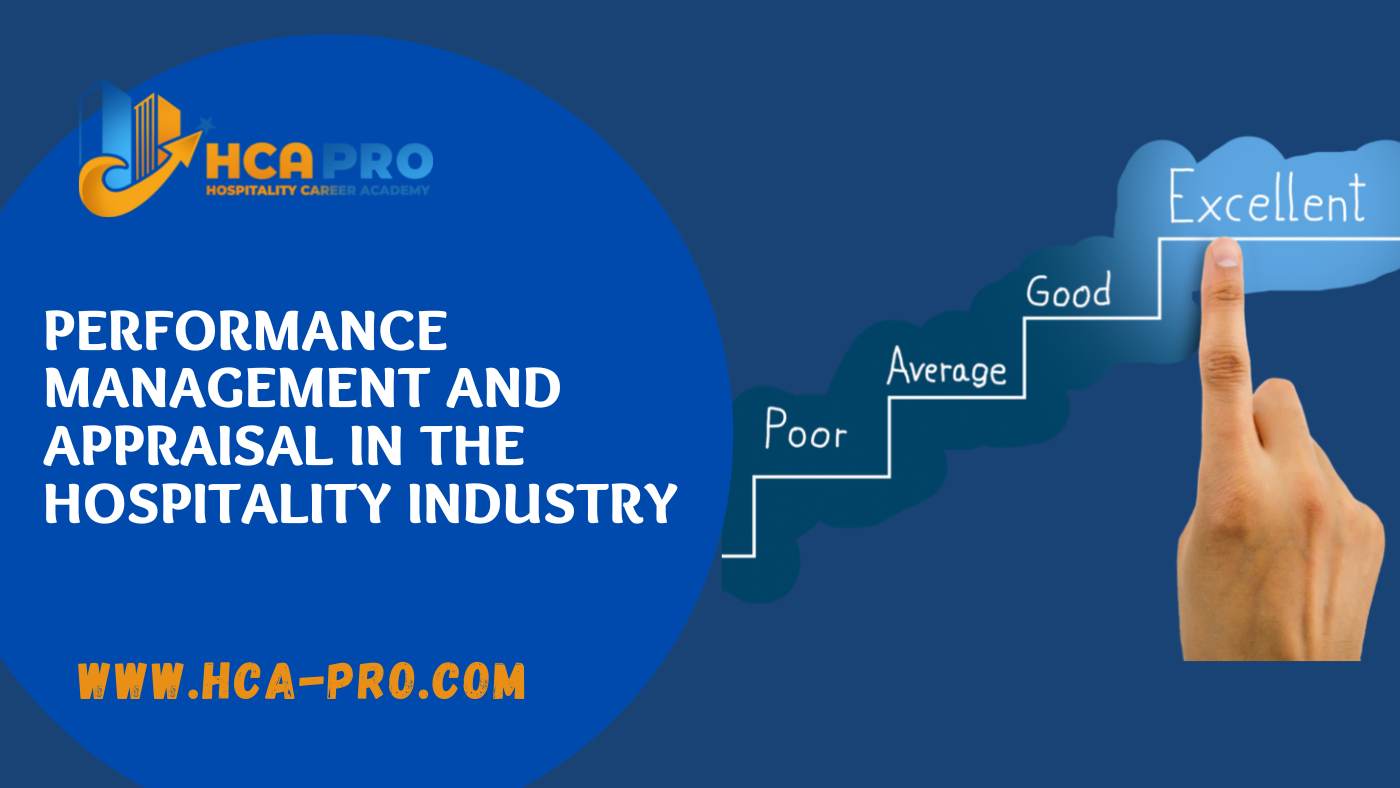
The Importance of Performance Management and Appraisal in the Hospitality Industry
Performance management and appraisal in the hospitality industry is essential to ensuring that guests have an enjoyable and memorable experience. It is a process that evaluates and improves the performance of employees in various roles such as front-line staff, managers, and supervisors. Effective performance management and appraisal not only improves customer service and satisfaction, but it also increases employee engagement and retention, and drives overall business success.
Setting Clear and Measurable Goals and Objectives:
Setting clear and measurable goals and objectives is an important aspect of performance management and appraisal in the hospitality industry. It helps to ensure that employees understand what is expected of them and can focus their efforts on achieving specific targets.
When setting goals and objectives, it's important to ensure that they are specific, measurable, achievable, relevant and time-bound (SMART). This means that the goals should be clear, with specific targets and deadlines. For example, a hotel in New York City might set a goal of achieving a 90% customer satisfaction rate and a 90% occupancy rate within a specific time frame.
It's also important to involve employees in the goal-setting process. This can help to ensure that they are motivated and committed to achieving the goals, as they will have had a say in what is being targeted.
Additionally, hotels can set goals and objectives for different areas of the business, such as customer service, sales, and revenue. This can help to ensure that employees are focused on the most important aspects of the business, and can help to improve overall performance.
It's also important to regularly review and adjust the goals and objectives as needed, to ensure they are still relevant and achievable. This will help to ensure that employees are always working towards the most important targets and that the hotel is on track to achieve its overall goals.
For example, a hotel in New York City might set a goal of achieving a 90% customer satisfaction rate and a 90% occupancy rate.
Setting Goals and Objectives for Employee Performance in the Hospitality Industry
Providing Regular Feedback and Coaching:
Providing regular feedback and coaching is an important aspect of performance management and appraisal in the hospitality industry. It is a key component in helping employees understand their strengths and areas for improvement and can be done through various means.
One way to provide feedback and coaching is through regular one-on-one meetings with employees. These meetings can be scheduled on a weekly or monthly basis, and can be used to discuss progress towards goals and objectives, as well as to provide feedback and coaching on specific areas of performance.
Another way to provide feedback and coaching is through team meetings. These meetings can be used to provide feedback and coaching to multiple employees at once, and to discuss team performance and goals.
Additionally, hotels can use performance evaluation tools to provide feedback and coaching. These tools can include self-evaluation forms, peer evaluations, and supervisor evaluations. These evaluations can be used to assess employee performance over a specific period of time, and to provide feedback and coaching on specific areas of performance.
It's important to provide regular, timely and specific feedback, whether positive or constructive, to the employee. This helps them to understand how their actions and behaviors impact the overall performance of the hotel and guests satisfaction.
Moreover, providing regular coaching to employees can help them to develop new skills and to improve their performance. This can include training on customer service, sales techniques, and management skills. By investing in the development of employees, hotels can ensure that they have a skilled and motivated workforce that is able to provide excellent service to guests.
The Importance of Feedback and Coaching in Performance Management and Appraisal in the Hospitality Industry
-
Performance Evaluations and Reviews:
Performance evaluations and reviews are an important aspect of performance management and appraisal in the hospitality industry. They are used to assess an employee's performance over a specific period of time and to identify areas for improvement.
Performance evaluations can be conducted by a supervisor or manager and should provide specific feedback on an employee's performance, as well as suggestions for improvement. These evaluations can be conducted on a regular basis, such as annually or semi-annually, depending on the hotel's policies.
It's important to use a variety of evaluation methods to get a more comprehensive understanding of the employee's performance, such as self-evaluation, peer evaluations, and supervisor evaluations. This will give a well-rounded view of the employee's performance and help to identify areas for improvement.
During the evaluation, it's important to give specific feedback, whether positive or constructive, to the employee. This helps them to understand how their actions and behaviors impact the overall performance of the hotel and guests satisfaction.
Additionally, performance evaluations and reviews can be used to identify opportunities for training and development, which can help to improve employee performance and drive overall business success.
Performance Evaluation and Review Techniques in the Hospitality Industry
-
Hospitality Performance Review Template:
A hospitality performance review template is a tool that can be used to ensure that evaluations are consistent and that all aspects of an employee's performance are considered. A typical template might include sections for customer service, teamwork, attendance, and job knowledge.
The template should be designed in a way that makes it easy for supervisors and managers to evaluate employee performance, and should be aligned with the hotel's goals and objectives. It should also include a section for providing feedback and coaching, as well as a section for identifying opportunities for training and development.
When using the template, it's important to ensure that evaluations are conducted fairly and consistently, and that all employees are evaluated on the same criteria. It's also important to involve employees in the evaluation process, giving them the opportunity to provide their own self-evaluation and to comment on the evaluations provided by supervisors and managers.
Additionally, the template should be reviewed and updated regularly to ensure that it remains relevant and effective. This can include changing the format, adding or removing sections, or revising the criteria used for evaluation.
-
Example of a hospitality performance review template:
Employee Name: _________________________
Position: _________________________
Review Period: _________________________
I. Customer Service
-
Demonstrates a positive attitude towards guests
-
Handles guest complaints in a professional manner
-
Provides prompt and efficient service
-
Maintains a high level of grooming and appearance
II. Teamwork
-
Works well with other team members
-
Participates in team meetings and training sessions
-
Contributes to a positive work environment
-
Provides support and assistance to other team members
III. Attendance
-
Consistently arrives to work on time
-
Notifies management of absences in a timely manner
-
Adheres to the hotel's attendance policies
IV. Job Knowledge
-
Has a good understanding of the hotel's policies and procedures
-
Is able to perform job duties in an efficient manner
-
Continuously seeks opportunities to improve job knowledge and skills
V. Feedback and Coaching
-
Supervisor's Feedback: _________________________
-
Employee's Self-evaluation: _________________________
-
Areas for Improvement: _________________________
VI. Training and Development Opportunities
-
Training Needs: _________________________
-
Development Opportunities: _________________________
-
Providing Training and Development Opportunities:
In addition to regular evaluations, it is also important to provide training and development opportunities for employees in the hospitality industry. This can include training on customer service, sales techniques, and management skills. By investing in the development of employees, hotels can ensure that they have a skilled and motivated workforce that is able to provide excellent service to guests.
The Importance of Training and Development in Performance Management and Appraisal in the Hospitality Industry
-
Lack of Information in the Hospitality Industry:
In the hospitality industry, there is often a lack of information on employee performance and customer satisfaction. This can make it difficult to identify areas for improvement and to set goals and objectives for employees. To overcome this, hotels should invest in customer feedback and survey tools, and in employee performance tracking systems.
Overcoming the Lack of Information in Performance Management and Appraisal in the Hospitality Industry
One of the challenges in the hospitality industry is the lack of information on employee performance and customer satisfaction. This can make it difficult to identify areas for improvement and to set goals and objectives for employees. To overcome this, hotels should invest in customer feedback and survey tools, and in employee performance tracking systems.
One solution is to implement a customer satisfaction survey system that allows guests to provide feedback on their experience. This feedback can then be used to evaluate employee performance and to identify areas for improvement.
Another solution is to implement an employee performance tracking system that allows managers to monitor employee performance in real-time. This can include metrics such as sales, occupancy rates, and customer satisfaction scores.
Hotels can also use tools such as employee engagement surveys to gather information on employee satisfaction and engagement. This can provide valuable insights into how employees feel about their work and the hotel, and can be used to identify areas for improvement.
Additionally, hotels can use data analytics to track key performance indicators and make data-driven decisions. This can help them to identify patterns and trends in customer and employee behavior, and make improvements accordingly.
In summary, hotels can overcome the lack of information in performance management and appraisal by investing in customer feedback and survey tools, employee performance tracking systems, employee engagement surveys, and data analytics. By collecting and analyzing this data, hotels can make informed decisions about how to improve employee performance and customer satisfaction.
Conclusion:
In conclusion, performance management and appraisal is a vital aspect of the hospitality industry, and it is essential for hotels to have a well-structured system in place. By setting clear goals and objectives, providing regular feedback and coaching, conducting performance evaluations and reviews, and offering training and development opportunities, hotels can ensure that they have a skilled and motivated workforce that is able to provide excellent
Read More: Introduction To Performance Management: Overview Of The Concept And Its Importance To Human Resource Management & Best Practices For Effective Performance Management In The Hospitality Industry
